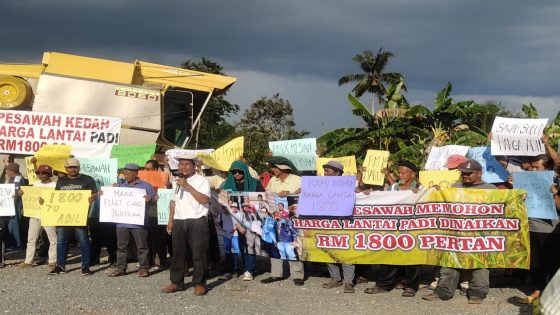On February 6, 2025, paddy farmers in Jerlun rallied to demand a floor price of RM1,800 per metric ton. With rising costs of living and farming, many are questioning the sustainability of their livelihoods. Will the government respond to their urgent needs?
- Rice price increase demands from farmers
- Proposed floor price: RM1,800 per metric ton
- Farmers burdened by rising operational costs
- Quality issues with private seed supply
- Debt concerns for small-scale rice farmers
- Call for government support for agriculture sector
Farmers Demand Higher Paddy Prices Amid Rising Costs in Malaysia
Why are Malaysian farmers calling for a price increase? The current floor price of RM1,300 per ton is not enough to cover their expenses, leaving many in debt. As costs for machinery, seeds, and pest control rise, farmers are struggling to make ends meet. The recent peaceful protest at the PAS Complex in Jerlun attracted nearly 200 farmers, all united in their demand for change.
Challenges Faced by Paddy Farmers in Malaysia’s Agricultural Sector
Farmers are not only struggling with low prices but also with the quality of seeds provided by private suppliers. Many have reported that they need to use more seed bags than before, increasing their costs significantly. This situation raises several questions:
- How can farmers sustain their operations with rising input costs?
- What measures can be taken to improve seed quality?
- Is the government doing enough to support local farmers?
- What impact will this have on Malaysia’s food supply chain?
Impact of Rising Costs on Farmers’ Livelihoods
The financial burden on farmers is mounting. With a demand for RM1,800 per ton, farmers believe this price is necessary to cover operational costs. The difference of RM500 per ton could mean the difference between survival and bankruptcy for many small-scale farmers. As they face debts and rising expenses, the question remains: how long can they continue without adequate support?
Government Response to Farmers’ Demands
Farmers are urging the government to heed the call of the Yang di-Pertuan Agong to support agricultural communities. They hope for policies that will ensure fair pricing and better quality seeds. The dissatisfaction with current leadership, particularly from the Lembaga Pertubuhan Peladang, has left many feeling overlooked. Will the government take action to address these grievances?
Future of Agriculture in Malaysia
The future of agriculture in Malaysia hinges on the government’s response to these pressing issues. With food security at stake, it is crucial for authorities to engage with farmers and understand their challenges. Addressing these concerns could lead to a more sustainable agricultural sector, benefiting both farmers and consumers alike.
































